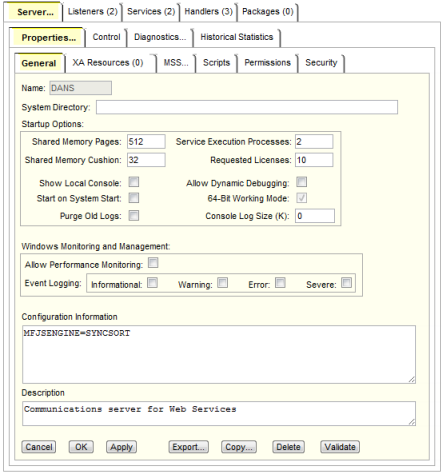SORT Engine Environment Variables
This topic lists environment variables that relate to the sorting functionality.
- MFJSENGINE
- Specifies which sort engine the utility MFJSORT is to emulate.
-
Syntax
Values:SET MFJSENGINE=value
- DFSORT Emulates DFSORT
- SYNCSORT Emulates SYNCSORT
Example

Default
The default is DFSORT.
- MFJSTATS
-
For a COBOL sort not running under mainframe emulation, setting the environment variable MFJSTATS to ON creates a report containing statistics for the SORT that is displayed to SYSOUT. If a report file already exists for a previous SORT, the new statistics are appended to the end of the previous one.
If you are performing a COBOL sort using mainframe emulation, you can create a statistics report by modifying the JCL statement.
Syntax
SET MFJSTATS=switch
Parameters
switch Switches report creation ON or OFF. The default is OFF.
- SORTCOMPRESS
- Tells the system whether or not to execute a compression routine on each record to be sorted.
Syntax
SET SORTCOMPRESS=5
Parameters
5 This is the only value that you can supply. It allows for run-length encoding of sort records, resulting in much better performance when records contain multiple repeated characters.
Comments
This variable is recommended if the sort records contain many single repeated characters, for example, multiple spaces, as it can be very effective in improving memory usage and therefore sort performance.
Example
SET SORTCOMPRESS=5
- SORTSCHEME
- Activates a sortscheme. Use in conjunction with SORTSPACE for improved performance.
-
Syntax
ValuesSET SORTSCHEME=1
- SORTSCHEME=1 - this is the only valid value for the environment variable. See SORTSPACE for more information.
- SORTSPACE
- The amount of memory to be allocated to internal workspace for SORT operations. This can be specified in different formats:
for example, you could specify 64M, 2G, and 1000000 to give sort memory areas of 64 Megabytes, 2 Gigabytes and 1000000 bytes
respectively.
Syntax
SET SORTSPACE=n[K|k|M|m|G|g]
Parameters
n[K|k|M|m|G|g The amount of memory to be allocated to internal workspace for SORT operations. K or k indicates kilobytes, M or m indicates megabytes and G or g indicates gigabytes. No letter indicates bytes. Defaults to 1 megabyte.
Comments
A larger value for SORTSPACE will generally result in a faster sort. However, if you specify a value that exceeds the capacity of main memory in your computer, such that the operating system has to page memory in and out, performance will be degraded.
Example
SET SORTSPACE=1024K
- SORTTEMPSPACE
- Specifies the amount of memory to be allocated to temporary workspace for SORT operations.
Syntax
SET SORTTEMPSPACE=n[K|k|M|m|G|g]
Parameters
n[K|k|M|m|G|g] The amount of memory to be allocated to temporary workspace for SORT operations. K or k indicates kilobytes, M or m indicates megabytes and G or g indicates gigabytes. No letter indicates bytes. 32 megabytes is the lowest amount of memory that can be allocated.
Comments
The memory allocation strategy used by SORT can be adjusted through use of SORTTEMPSPACE, which generally improves performance in systems suffering from memory fragmentation.
Example
SET SORTTEMPSPACE=250MB
- SORTTYPE
- Defines the sort type.
-
Syntax
ValuesSET SORTTYPE=2
- SORTTYPE=2 Forces SORT to use the file handler, so that format modifications are picked up from the extfh.cfg file.
- Not setting this variable means that SORT will try to use CBL_ routines to read and write files to improve performance.
Note: 2 is the only valid value for this environment variable.